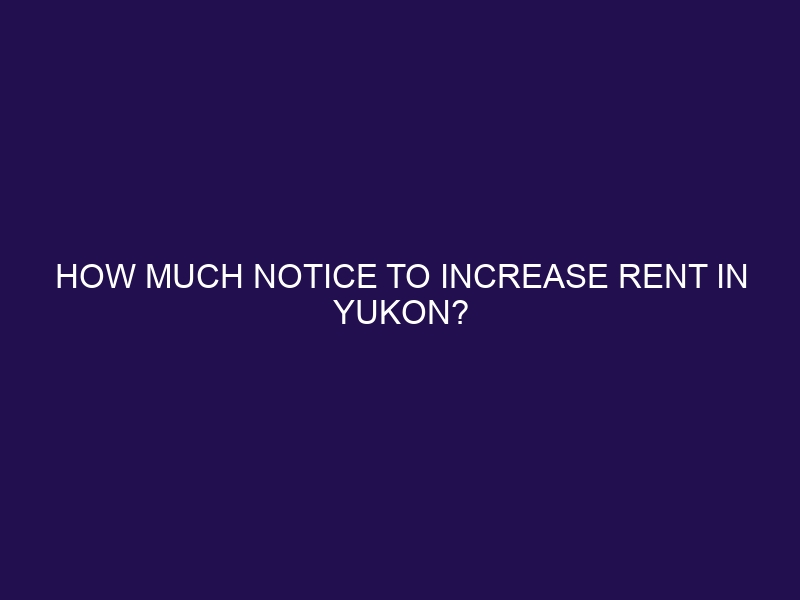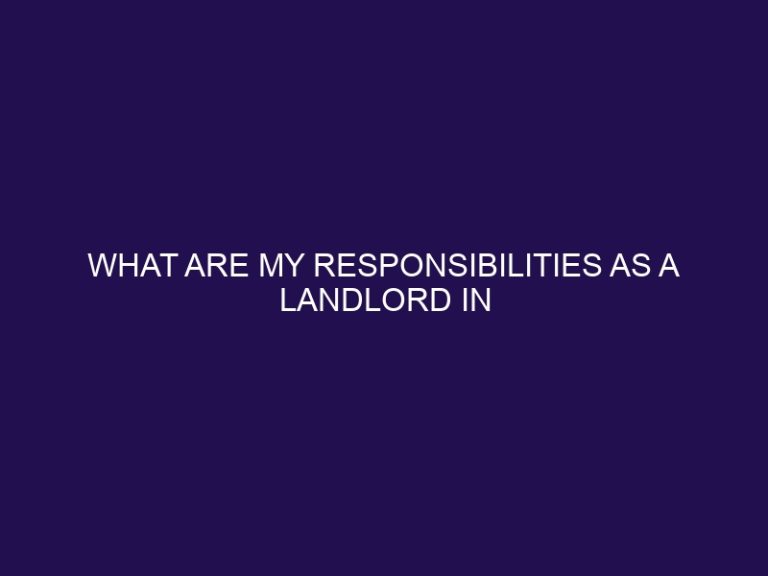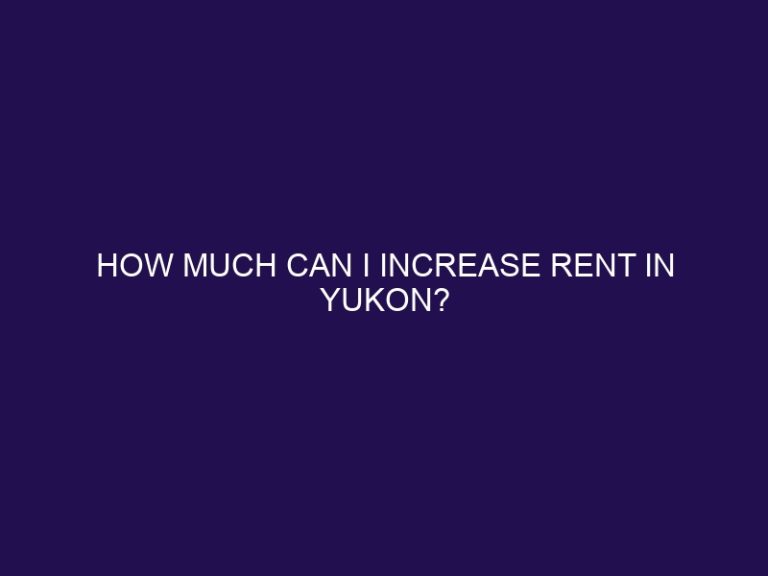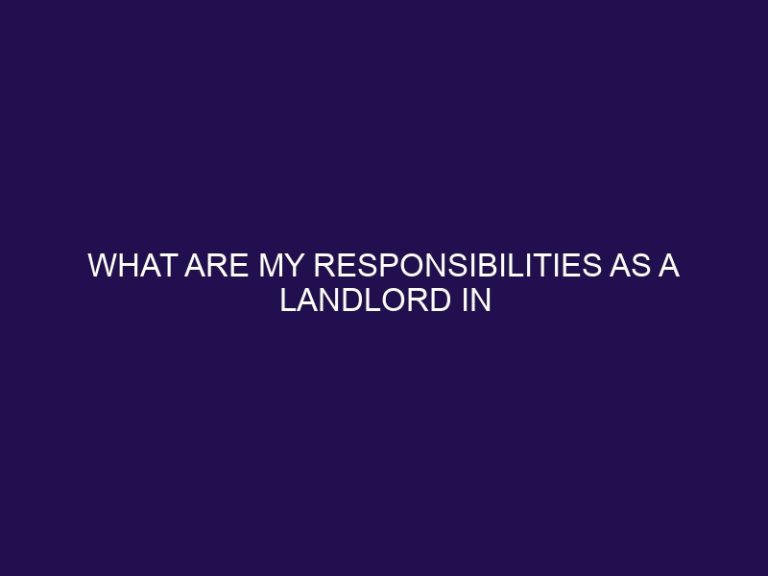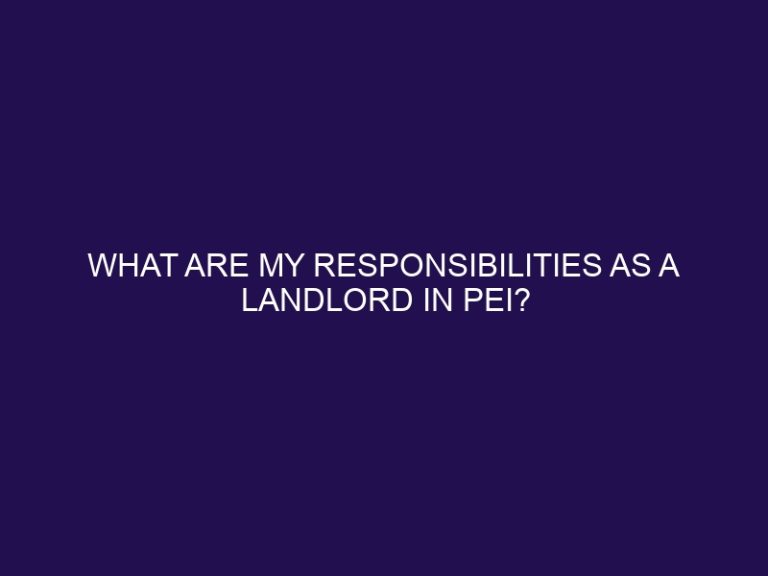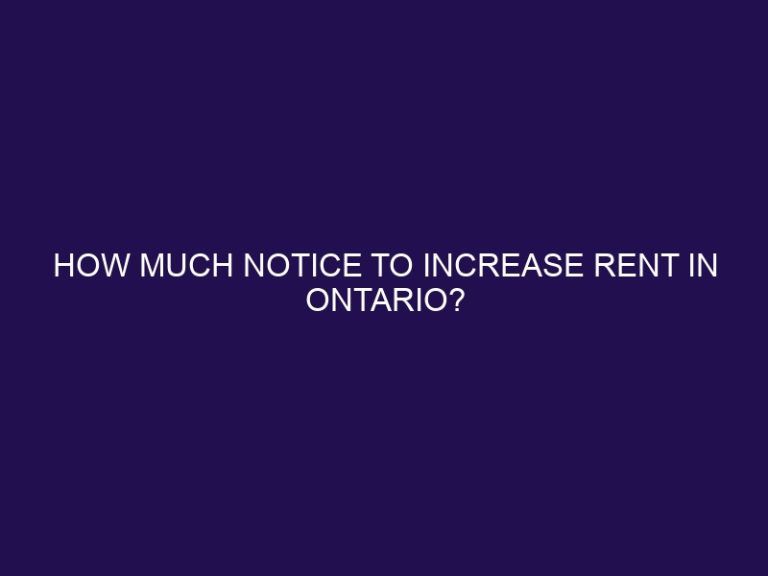How much notice to increase rent in Yukon?
.jpg)
Understanding the Rent Increase Guidelines in Yukon is essential for both landlords and tenants to ensure a fair and transparent rental process. The guidelines outline the rules and regulations regarding rent increases, including the notice period and limitations on the percentage increase. By familiarizing yourself with these guidelines, you can effectively navigate rent increases and protect your rights as a tenant or landlord.
In Yukon, the Rent Increase Guidelines specify the rules for increasing rent and are governed by the Residential Tenancies Act. These guidelines aim to balance the interests of both landlords and tenants and ensure stability in the rental market.
The Rent Increase Guidelines apply to all residential rental properties in Yukon, including houses, apartments, and condominiums. It is important for both tenants and landlords to understand their rights and obligations under these guidelines to maintain a harmonious landlord-tenant relationship.
The notice period for rent increase is an essential aspect of the Rent Increase Guidelines. In Yukon, the standard notice period for rent increase is three months. However, there are exceptions to this standard, which depend on specific circumstances such as the length of the tenancy, the purpose of the rental unit, and whether the unit is subsidized or exempt from the Residential Tenancies Act.
When calculating the rent increase, landlords in Yukon must follow a specific formula outlined in the Rent Increase Guidelines. The formula takes into account the Consumer Price Index and ensures that the rent increase is reasonable and fair. there are limitations on the percentage of rent increase that landlords can implement within a year to protect tenants from substantial and sudden increases.
Tenants have rights and protections when it comes to rent increases. If tenants believe that a rent increase exceeds the guidelines or is unjustified, they have the right to dispute the increase through the Residential Tenancies Office. Tenants can negotiate the rent increase with their landlord by engaging in open communication and discussing their concerns.
Key takeaways:
- Standard Notice Period: In Yukon, the standard notice period for rent increase is 3 months. Landlords must provide written notice to tenants with details of the increased rent amount.
- Exceptions to Notice Period: Certain exceptions may apply to the standard notice period for rent increase, such as when the rental agreement is for a fixed term or if the tenant fails to pay rent or breaches the rental agreement.
- Tenants’ Rights: Tenants have the right to dispute a rent increase if they believe it is unfair or contrary to the Rent Increase Guidelines. They can also negotiate the rent increase with the landlord to reach a mutually agreeable solution.
Understanding the Rent Increase Guidelines
Understanding the rent increase guidelines is crucial for both tenants and landlords in Yukon. These guidelines outline the proper procedures and timelines for increasing rent in a fair and lawful manner. By familiarizing yourself with and comprehending these guidelines, you can maintain a harmonious landlord-tenant relationship while ensuring that your rights and responsibilities are upheld. This knowledge empowers both parties and promotes transparency and fairness within the rental market in Yukon, enhancing understanding of the rent increase guidelines.
What are the Rent Increase Guidelines in Yukon?
The Rent Increase Guidelines in Yukon provide regulations for landlords when increasing rent in residential properties. These guidelines apply to all tenants, regardless of their tenancy agreement. If you are wondering, “What are the Rent Increase Guidelines in Yukon?” the standard notice period for rent increase in Yukon is three months. There are exceptions to this period for certain situations. The rent increase is calculated based on the Residential Rent Index and is subject to limitations on the percentage increase. Tenants have rights and protections that allow them to dispute or negotiate a rent increase with their landlord. It is important for landlords to comply with these guidelines to ensure a fair and legal process.
Who do the Rent Increase Guidelines apply to?
The Rent Increase Guidelines in Yukon apply to all tenants who are renting residential properties in the territory. These guidelines aim to protect tenants from significant and unfair rent increases. The question “Who do the Rent Increase Guidelines apply to?” can be answered by stating that these guidelines apply to all tenants, regardless of whether they are renting from a private landlord, a corporation, or a government agency. The main purpose of these guidelines is to ensure that all tenants have the right to a reasonable increase in rent. In order to maintain a fair and harmonious rental relationship, it is essential for both tenants and landlords to be aware of these guidelines and to comply with them.
Notice Period for Rent Increase
To ensure a smooth and fair process, landlords in Yukon must follow certain steps when increasing rent in accordance with the Residential Tenancies Act in Yukon. Here are the key elements to consider regarding the notice period for rent increase:
- Familiarize yourself with the Residential Tenancies Act in Yukon to understand the specific regulations for rent increase notices.
- Provide written notice of rent increase to the tenant, ensuring it includes the effective date and amount of the increase.
- Give the tenant proper notice within the required notice period for rent increase, which is generally three months before the proposed increase goes into effect.
- Ensure the notice is delivered to the tenant in a legally acceptable manner, such as in person or by registered mail.
- Keep a copy of the notice and any other relevant documentation for your records.
By following these steps, landlords can comply with the notice period for rent increase and maintain a mutually respectful relationship with their tenants.
What is the Standard Notice Period for Rent Increase in Yukon?
The standard notice period for rent increase in Yukon is three months. Landlords must provide tenants with written notice at least three months before the proposed rent increase takes effect. This allows tenants to plan their finances accordingly and make informed decisions. It is important for both landlords and tenants to understand their rights and responsibilities regarding rent increases to maintain a healthy landlord-tenant relationship. To answer the question “What is the Standard Notice Period for Rent Increase in Yukon?“, the standard notice period is three months. Pro-tip: To avoid any misunderstandings or conflicts, it is recommended for landlords and tenants to communicate openly and discuss any concerns or questions regarding rent increases well in advance.
Are there any Exceptions to the Standard Notice Period?
Are there any exceptions to the standard notice period for rent increase in Yukon? According to the Residential Tenancy Act, if the tenant has a fixed-term lease agreement, then the landlord cannot increase the rent during that period unless there are exceptional circumstances. Once the fixed-term lease agreement expires and converts to a periodic tenancy, the landlord must provide the tenant with three months’ notice before increasing the rent. It is important for both landlords and tenants to familiarize themselves with the specific regulations and laws regarding rent increases in Yukon to ensure compliance and avoid any misunderstandings or disputes.
Pro-tip: Before signing a lease agreement, tenants should carefully review the terms and conditions, including any provisions related to rent increases and notice periods.
Calculating the Rent Increase
Calculating the Rent Increase in Yukon
To calculate the rent increase in Yukon, it is important to follow specific steps in order to meet legal requirements and maintain a fair rental agreement.
Pro-tip: It is always recommended to consult a professional or seek legal advice to ensure compliance with rental regulations and to avoid any potential disputes.
How is the Rent Increase Calculated in Yukon?
How is the Rent Increase Calculated in Yukon?
The rent increase in Yukon is determined by following the formula provided by the Residential Tenancies Act. This formula takes into consideration two factors: the percentage increase in the Consumer Price Index (CPI) and the landlord’s expenses for municipal taxes, insurance, and utilities. The resulting figure is then added to the current rent. To ensure transparency, landlords must provide written notice three months in advance before implementing any rent increase. It is crucial for landlords to adhere to these guidelines and guarantee that the increase remains reasonable and within the maximum allowed percentage.
What are the Limitations on Rent Increase Percentage?
The limitations on rent increase percentages in Yukon provide important protections for tenants. Landlords must follow specific guidelines when raising rent to prevent excessive increases. What are the Limitations on Rent Increase Percentage? The maximum allowable rent increase percentage is determined by the residential rent index, which takes into account factors such as the Consumer Price Index and rental market conditions. This ensures that rent increases are fair and reasonable. It’s important for tenants to be aware of their rights and understand the limitations on rent increase percentages to avoid unfair practices. Pro-tip: As a tenant, it’s always a good idea to familiarize yourself with the rental regulations in your jurisdiction and consult a legal professional if you have any concerns.
Tenants’ Rights and Protections
- Tenant’s Rights and Protections: In Yukon, tenants have the right to live in a habitable rental unit free from health hazards and with proper repairs and maintenance. Yukon’s Residential Landlord and Tenant Act provides various protections, such as limiting rent increases to once every 12 months and requiring landlords to provide written notice of rent increases.
- Notice Period: Landlords in Yukon must give at least three months’ written notice for rent increases or when ending a tenancy, unless there are exceptional circumstances.
- Dispute Resolution: If there are issues between tenants and landlords, they can seek resolution through the Yukon Rental Board or through mediation.
Fact: It’s important for tenants to familiarize themselves with their rights and protections under the Residential Landlord and Tenant Act to ensure a fair and respectful renting experience.
Can tenants dispute a rent increase?
Tenants in Yukon have the right to dispute a rent increase if they believe it is unjust or unreasonable. Can tenants dispute a rent increase? They can do so by filing a complaint with the Residential Tenancy Office. This process allows tenants to present their case and provide evidence to support their claim. Can tenants dispute a rent increase? The office will then assess the situation and make a decision based on the evidence provided. Can tenants dispute a rent increase? It is important for tenants to be familiar with their rights and to gather any relevant documentation before disputing a rent increase. By exercising their rights, tenants can ensure that they are being treated fairly in their tenancy agreement.
Can tenants negotiate the rent increase with the landlord?
Tenants in Yukon have the ability to negotiate the rent increase with their landlords. This provides an opportunity for a fair and open discussion regarding the proposed increase and potentially finding a solution that is acceptable to both parties. By participating in negotiations, tenants can voice their concerns and present any relevant factors that might impact their ability to afford the rent increase. Landlords may also be open to considering alternative arrangements or adjustments to the increase, depending on the circumstances. This process promotes a collaborative approach and has the potential to result in a mutually beneficial outcome.
Final Thoughts
“When it comes to increasing rent in Yukon, it is crucial for landlords to follow the legal guidelines and provide the required notice to tenants. Communication and transparency are key in maintaining a positive landlord-tenant relationship. It is recommended for landlords to keep records of all communication and any changes in rent. This can help resolve any potential disputes in the future. Remember, being fair and considerate to tenants’ needs and financial situations can go a long way in fostering a harmonious living environment. Final thoughts, a pro-tip: Maintaining open lines of communication with tenants throughout the tenancy can help address any issues or concerns before they escalate.”
Additional Resources
When it comes to increasing rent in Yukon, it’s important to understand the legal requirements and guidelines. Fortunately, there are additional resources available to help landlords and tenants navigate these regulations. The Yukon Residential Tenancies Office provides information on rent increases and tenant rights. The Residential Tenancies Act outlines the rules for increasing rent and the appropriate notice period. Landlords and tenants can refer to these additional resources, such as online guides and brochures, for clarification and guidance on rent increase procedures.
Facts:
Some Facts About How Much Notice to Increase Rent in Yukon:
- ✅ There is no specific time period required for landlords to give notice before increasing rent in Yukon. (Source: Our Team)
- ✅ Landlords in Yukon can increase the rent as often as they wish, as long as they provide reasonable notice each time. (Source: Our Team)
- ✅ The 30-day notice period required for terminating a month-to-month lease is typically used as reasonable notice for a rent increase in Yukon. (Source: Our Team)
- ✅ Yukon residential tenancy laws do not specify a cap or limit on the amount by which landlords can increase the rent. (Source: Our Team)
- ✅ Landlords in Yukon cannot raise the rent during the fixed term of a lease, unless allowed by the lease agreement. (Source: Our Team)
Frequently Asked Questions
1. How much notice does a landlord in Yukon need to give to increase rent?
In Yukon, landlords are required to provide reasonable notice before increasing the rent. The 30-day notice period, typically used as reasonable notice for terminating a month-to-month lease, is commonly followed for rent increases as well.
2. Are there any restrictions on rent increases in Yukon?
No, Yukon does not have rent control laws or any legal limit on rent increases. Landlords in Yukon have the freedom to raise the rent by any amount they wish, as long as they provide proper notice and avoid discriminatory or retaliatory reasons.
3. Can landlords increase rent during the fixed term of a lease in Yukon?
Generally, landlords cannot raise the rent during the fixed term of a lease in Yukon, unless specifically allowed by the terms of the lease agreement. Rent increases are typically applicable upon lease renewal or conversion to a month-to-month tenancy.
4. Is it permissible for landlords to raise rent for discriminatory reasons in Yukon?
No, landlords in Yukon are prohibited from raising the rent based on discriminatory reasons such as race, gender, sexual orientation, religion, nationality or origin, familial status, or disability. Such actions would be in violation of the Federal Fair Housing Act.
5. Can a landlord increase rent in retaliation against a tenant in Yukon?
No, under Yukon’s tenancy laws, landlords are prohibited from increasing rent in retaliation if they suspect or discover that the tenant is a victim of domestic violence, sexual violence, or stalking. Landlords must act in good faith and not use rent increases as a means of retaliation.
6. How many times can a landlord increase the rent in Yukon?
In Yukon, landlords can increase the rent as often as they wish, as long as they provide reasonable notice each time. There are no specific limitations on the number of rental increases a landlord can implement, but they are required to give proper notice before each increase.

